March - April 2017
Dear Friends,
Our 2017-18 fellowship class is almost complete! As we approach the end of our placement process, we are excited for Princeton University’s upcoming Reunions weekend and Fellows’ Orientation. The staff are also just returning from a very successful 2016-17 Leadership Retreat in Moshi, Tanzania. Check out some pictures on our Facebook Page!
In this Fellows Flyer, Devan Darby Bartels (2006-07 Fellow with the Botswana-Harvard Partnership in Botswana) and David Bartels (2006-07 Fellow with the Baylor International Pediatric HIV/AIDS Initiative in Lesotho) share their recent trip back to the African continent.
Please enjoy this issue of the Fellows Flyer.
Warm regards,
Jodianna Ringel
Executive Director
PiAf Connections
Please click below to check out pictures of our Fellows, Alums and other members of the PiAf family meeting up at home and around Africa.
Notes from the Field
By Bailey Adams, 2016-17 Fellow with Gardens for Health International in Rwanda
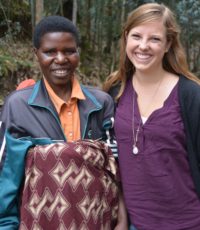
Bailey (right) with GHI partner mother, Nyirarukumdo Datvia after an interview in Busogo, Northern Rwanda.
Rwanda is known as the land of a thousand hills. It is a gorgeous country of terraced fields, lush agricultural land, towering volcanoes, and rolling rainforests. You would be hard pressed to find a place where the land is actually flat. But while Rwanda may be the land of a thousand hills, it’s also a land of a thousand stories. The stories are what make the country and its beauty come alive for me. At Gardens for Health International (GHI), part of my job is to collect those stories and to share them with the world. I love giving voices to our partner communities. I love sitting down with mothers in their homes, learning about their successes and challenges and talking about their hopes and dreams for the future.
At GHI we have a fairly strict communications protocol to protect and empower our families that choose to share their stories. Traditionally, the language used to describe development programs denotes the “beneficiary” as a desperate victim. It implies an unequal power dynamic between the parties involved and it disempowers people by describing them as passive recipients rather than recognizing and appreciating their own agency in creating change. In essence, while many of these storytelling techniques may be successful in garnering support and raising funds, they can be very exploitative.
When we tell stories at GHI, we seek to empower the families we work with, honoring their real experiences – the successes and the challenges – and their powerful role to make real change in their own lives. I am always looking for ways to be locally authentic while telling the stories our families would be proud to tell themselves.
Perhaps most importantly, we view the families in our program as partners – our equal partners. We recognize their power to take care of their families and raise healthy children. We admire their strength. We acknowledge the time, effort, and dedication they choose to commit when agreeing to participate in our program. And we represent that accordingly in our communications.
I am constantly inspired by this outlook on development and development communications. My academic career left me feeling jaded about the possibility for positive results in the field of development, but watching the way my colleagues engage with our partner communities and the effort GHI puts in to upholding the value of those partnerships, I am encouraged.
My favorite part of this experience is the time I get to spend with the families in our program, learning about the diversity of experiences across the country, hearing as many of the thousands of stories as I can, and seeing them bring Rwanda to life.
Notes from the Field
By Alex Cheston, 2016-17 Fellow with eleQtra in Uganda
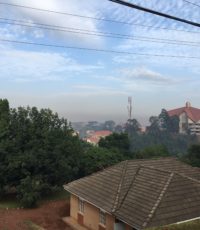
A view of Kampala on Alex’s walk to work.
What I hadn’t expected, when I’d answered his question about my religion, was the laughter. Specifically, the hysterical laughter. When I told Steven that I didn’t actually believe in god he couldn’t contain himself. “So, creation? Where you came from?” he said, suppressing his glee, “you never even bothered to find out!” This was my second morning in Kampala and the issue came up again at lunch. “So what do you believe?” Alfred said, always getting to the point. He caught me off guard. “Oh, like, evolution.” I’d never had to defend, or even explain, my philosophy. I had been raised in New York City in an almost entirely secular community, and I was beginning to understand the ways in which this was unusual.
There are habitual novelties that I’ve witnessed, living for the first time in a religious community. People do things on Sunday other than make brunch and watch movies; prayer occurs often, before meals and long bus rides; and zealots proselytize from their street-side perches. “Ladies and gentlemen, make the choice,” this man exhorted to commuters trapped in an idle minivan. “Jesus or Satan, and I can tell you, believe me, Satan is not a good choice.” He was looking at me, and it took everything I had to avoid contact with his wild, tenacious stare. But one day, when I felt a little depressed and lonely, he said something that caught my attention: “life is meaningless without Jesus.” I don’t believe that a life without religion is devoid of meaning, but religion is a tried and true method of making meaning out of life, and those raised with it have a solid ideology from which meaning naturally flows.
Like my peers in Africa and at home, I have been thrust from the structure of school into a world that seems less impressionable than people said it was. Meanwhile, I have migrated away from the culture, specific people and functions on which my identity and sense of purpose are founded. Consequently, the bad days are weighed down by aimlessness, boredom and a little confusion as to what I’m doing here. The concurrence of this dislocation and my novel exposure to spiritual society has put the spotlight on my own spiritual vacancy.
I don’t regret being raised the way that I have, nor do I think I will adopt any traditional form of spirituality. But I have realized that if I am to live the meaningful life that I intend to, it will take some work to discover a rich ideology to substitute the spiritual one that my friends here were raised with. I will need to engage in my own process of introspection and discovery. Maybe I’m making up for all those Sundays I spent playing video games.
In hindsight, I’ve realized that what impressed me about the laughter was the underlying conviction. It came from a place of unequivocal certainty – the kind that could clarify the world and our place in it. While it may interfere with our capacity to experience empathy for other beliefs, conviction (spiritual or otherwise) gives solidity to an otherwise flimsy human life. “When you look in the mirror, what do you see?” Charlotte said that day at lunch, fire reflected in her eyes. I shrugged. “Someone should preach to you.”
Notes from the Field
By Jessica Clarkson, 2016-17 Fellow with Kucetekela Foundation in Zambia
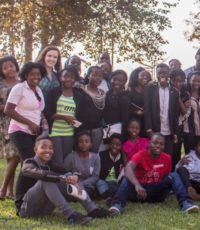
Jessica (3rd from the left, back row) at the Kucetekela Foundation reunion with sponsored students and alumni.
I spent the first half of the year determinedly not letting myself dwell on the question of what I will do next. When I took the leap to pursue this fellowship post, I did so with the intention of having a truly mindful experience, one in which I was focusing on the present joys and challenges, learning from them as I went, and open to opportunities and ideas that I couldn’t have anticipated prior to the fellowship. To build suspense, I’ll recap some aspects of my time here before sharing my future plans, which have now crystallized, seemingly on their own.
I found that my previous job, administering a scholarship program at UC Berkeley, prepared me well to work with secondary school scholarship recipients through Kucetekela Foundation (KF), and gave me solid footing as I adjusted to the change in environment. Day to day, I do a variety of activities: recruiting mentors, organizing work experience opportunities, and assisting with applications to prestigious summer programs and post-secondary opportunities, to name a few. In August, I had the privilege of attending the Yale Young African Educator’s conference in Harare, Zimbabwe, which allowed me to liaise with colleagues from my previous scholarship work. While there, I helped KF join a network for organizations that support high achieving low-income students across the African continent, so that our learning can be ongoing and benefit the organization after I leave. On the social side of things, I spent my first six weeks living with a Zambian host family, discovered a vibrant salsa dancing community, took Nyanja classes, attended weekly cards nights with friends, and sang in concerts at Alliance Francaise.
Through all of these experiences, my perspective has changed, and I am grateful to have a more concrete and personal understanding of how development issues that I have studied (such as poverty, access to medical care/education, corruption, the HIV/AIDS epidemic, etc.) manifest and affect daily life, as well as more systemic development.
After the 6-month mark, it became clear that I didn’t feel ready to prepare for departure from Zambia, that my work would feel somehow unfinished. Once I knew I could see myself staying longer, and a few key partners supported the initiative, a seed quickly grew into a tree, and I knew I would be opening a branch of a college access program called USAP. USAP, which began in 1999 in Zimbabwe, seeks to identify highly qualified and motivated, low-income students, and supports them in negotiating the admissions process for international universities. I could not have predicted this next step in the beginning, which is why I am so grateful to have had the privilege of a mindful year with Princeton in Africa to learn from educators in Zambia, liaise with others doing this kind of work in other countries, and finally see how I can best contribute my own skills and experience to help deserving students access brighter futures.
Notes from the Field
By Ben Grazda, 2016-17 Fellow with International Rescue Committee - Somalia in Kenya
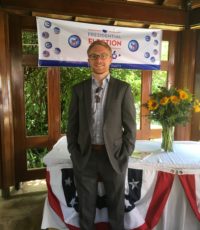
Ben at the U.S. Ambassador’s house on election day.
135,000 people displaced in four months. 363,000 acutely malnourished children. 110 people dead in the last 48 hours. 4,050,000 liters of water delivered in February. $156,000 given in cash assistance last week. 27 ambulance trips in Gaalkacyo.
Data drives humanitarian aid. It demonstrates impact. It tells an NGO if a project is working or a donor if their money is being well spent. As a crisis in a country escalates, NGOs, donors, think tanks, and elected officials all want to know what’s happening and what will have the biggest impact. Data is crucial for developing programs and saving lives, but it’s not what matters most. People are.
I am one of five PiAf fellows working at the International Rescue Committee (IRC), a global humanitarian organization responsible for responding to the world’s worst crises. The IRC provides humanitarian and development aid in 40 countries and resettles refugees in 29 U.S. cities, literally bringing families from harm to home.
Specifically, I work at the IRC’s Somalia office, based in Nairobi. In February of this year, the UN declared pre-famine conditions in Somalia, referencing two devastating years of drought and alluding to the possibility of repeating the country’s 2011 famine, which killed over a quarter million people. Donors are contributing hundreds of millions of dollars to stave off another crisis.
My job, like most of the other IRC fellows, is to compile information and use it to report on our programs to donors and apply for new funding. My computer is full of spreadsheets and word documents with figures describing our work. It’s easy to look at all of these statistics, especially when they get in the millions, as just intangible figures. They become talking points to reference on the news and in reports. Yet, the people the IRC works for are far more than numbers. Sure, they received their 7.5 liters of water for the day, but they also sang as they walked with their daughters, worried about their neighbors, and thought back about what their own childhoods were like, when things weren’t so bad.
People are complex. The situation we face is complex. 65 million people are displaced globally, one third of who fled their countries entirely. This global shift, bigger than any in modern history, is creating a new reality in the world, and it’s crucial we see these numbers as faces and not data points. They are individuals, our neighbors, and not a mass of people to be scared of.Albert Einstein fled Nazi Germany in 1933. A refugee himself, he adopted America as his home, and called for the creation of the IRC to help those left behind. Who will be the next Einstein, or even the next deli owner, schoolteacher, or architect? When refugees are given the chance they create their own businesses and add to the community around them. When we open our minds and our homes, we open others’ potential. All we need to do is look past the numbers.
Notes from the Field
By Helena Hengelbrok, 2016-17 Fellow with Baylor International Pediatric AIDS Initiative in Lesotho
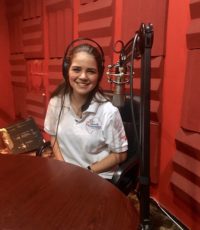
Helena presenting Teen Club during an episode of Positive Living.
Every day when I open my laptop, I’m faced with a choice: What project do I work on? Some days the answer involves working on the jingle for a youth radio show, other days it centers around data analysis and spreadsheets. This professional freedom and variety is exciting and is one of my favorite aspects of my fellowship at BIPAI Lesotho, but it has also come with its own set of challenges.
Having heard from past fellows that, like many PiAf fellowships, this placement came with a flexible job description, at the start of my year I looked forward to making the position my own. However, I also felt the pressure that comes with such freedom—my productivity and relative success were entirely in my hands. At the end of the year, would I feel proud of my contribution to the organization?
In the eight months that have passed since I arrived in Maseru, I have learned from the many consequences, both rewarding and challenging, of this freedom. One challenge I have set myself is ensuring that any project I undertake is in fact needed and beneficial to the organization and the youth I work with. However, I didn’t anticipate another obstacle that has arisen; namely, being able to work on so many projects that I have to be careful not to neglect past initiatives as new, more exciting ones take up more of my time and attention.
Mostly, however, the freedom in this position has allowed for incredible professional growth and given me the opportunity to work on projects I care deeply about. One of my first endeavors was to develop a monitoring and evaluation system for the Teen Club program, BIPAI Lesotho’s psychosocial support program for HIV-positive adolescents. I’ve also been able to implement programmatic changes, work on grant proposals, and serve as the de facto webmaster and Twitter account manager for BIPAI Lesotho. In recent months, I’ve focused on youth advocacy and empowerment, working in particular with members of the Wise Youth group, a group of HIV-positive 18-24 year olds who are patients at BIPAI Lesotho. Together, we have established a weekly radio show, “Positive Living,” on a youth-based radio station in Maseru. Every Friday morning, members of the Wise Youth group present their life stories on air and provide HIV-related education with support from Baylor staff.
It is not always instinctive to dedicate a day to analyzing data instead of working on Positive Living with the youth who have become my friends, but my motivation to open Excel rather than tweet about Positive Living is strengthened by the knowledge that the reports I produce will ultimately help improve the Teen Club program. I am grateful for the freedom that has resulted in a full to do list filled with projects I care about, and excited for the new initiatives and progress the coming months will bring.
Notes from the Field
By Liselot Koenen, 2016-17 Fellow with mothers2mothers in South Africa
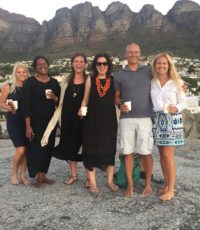
A long day at the office calls for a nice sunset picnic with the team.
Six days ago, I celebrated my work anniversary – exactly 7 months since I started at mothers2mothers (m2m). Fresh off of graduating with a degree in International Health, I landed in South Africa all those months ago excited to be in an environment where I could put my education into practice. At the time, it also felt a bit surreal to be back on the continent as I had just come back from completing field research for my thesis in rural Tanzania half a year before. I applied to PiAf hoping that this new experience would allow me to gain practical knowledge and understanding of how the organizational pieces fit together to improve all the dire public health problems I’d seen on the ground. Not surprisingly, it has done much more than just that.
My role within the Business Development team has placed me at the center of mothers2mothers – allowing me to gain a comprehensive understanding of m2m’s inner-workings as well as the complexities of grant funding and foreign aid. My day-to-day work is comprised of supporting the strategic and organizationally important efforts of the organization and its seven country programs, particularly with identification of funding opportunities and proposal development. So far, I have lead the coordination and writing of grant proposals, written capacity statements, and created a landscape analysis for a potential country expansion. I have also taken on the challenge of creating a knowledge management system for our team and the broader Resource Mobilization unit. Taking you into the particulars of the project would exceed the limitations of this post, but earning the nickname “junior IT” across the 70+ Head Office staff may offer you a glimpse of how this has begun to define my time at m2m.
My fellowship differs from those of my peers in that I do not have many bloggable stories of traveling to our model sites or interacting with Mentor Mothers. Nonetheless, I’ve loved my experience. I am proud to be part of an incredible and dedicated team that work incredibly long hours to ensure that m2m has the funding to do what our organization strives to do, which is to break the vicious cycle of pediatric AIDS and create a HIV-free generation.
Being confined to my miniature cubicle does take a toll at times, but I’m able to instantly boost my spirits when I take a quick look up from my computer screen to the most incredible view of Table Mountain to my right. No matter where I am, I’m constantly overwhelmed by the natural beauty of Cape Town and the endless array of activities it holds within – from hiking to outdoor concerts and markets to sunset walks on the beach. Not surprisingly, living a block from the ocean and a few minutes from the mountains has made it nearly impossible to not fall in love with this captivating city. That said, I’ve also made some truly meaningful connections both within Cape Town and with other PiAf Fellows, which has shaped and continues to shape my fellowship experience as I begin the second leg of this journey.
Notes from the Field
By Jordan Levine, 2016-17 Fellow with Population Services International in Tanzania
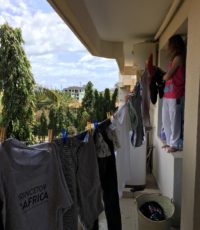
Tall clothesline and no step stool? Hamna shida.
My first week in Tanzania, someone said “hakuna matata” to me. I thought, “Wow, I can’t believe people actually say that here.” Well, as it turns out, they don’t. Tanzanians only say that to wazungu (white people) because they know how much wazungu love The Lion King. The comparable phrase used here is “hamna shida”, which means “no worries” or “it’s not a problem”, and the other Fellows and I have adopted it as our approach to life in Dar es Salaam. The lesson here is to not get frustrated or sweat the small stuff, especially over things that are out of your control.
It took my significant other visiting and pointing out things to which I had adapted, for me to see that I really had come a long way in taking this lesson to heart, and that the idiosyncrasies I’d become so accustomed to were not actually normal (by my American standards, at least). Carrying a 20-lb water cooler up four flights of stairs to the apartment each week since we don’t have potable tap water? Hamna Shida. Shrugging at the unidentified bug infestation in my laundry because I don’t have hot water in which to wash my clothes, so what’s my plan B? Hamna Shida. Giving 900 monetary bills, acquired over 26 ATM transactions, to our landlord to cover the first three months’ rent, since Tanzania has a cash economy and the exchange rate is 1 US dollar to 2,184 Tanzanian shillings? Hamna Shida.
This particular approach was helpful during my quest to obtain a residence permit, which was supposed to happen right after I entered Tanzania on a temporary work visa. It did not. My visa expired and I had to leave the country to then come back and buy another visa, ironically, to avoid deportation. I didn’t quite understand that logic but that’s okay, vacation time- hamna shida!
Well, not exactly. The first airline cancelled my flight 24 hours before takeoff. The second lost my reservation. The third finally came through with 16 hours to spare, but then I was stopped at the immigration counter and interrogated for having an expired visa (by officials from the same government entity responsible for said expired visa). So I wasn’t allowed to leave the country, but I wasn’t allowed to stay. It was a confusing time.
After much pleading and yoga breathing, I finally got through immigration, went on my trip, and got back into the country, somehow, far more easily than I got out of it. I can’t say I will cherish that particular experience, but it reinforced the importance of letting go of things beyond my control and trusting that everything will work out one way or another. Now, after six long months, I’m happy to report that I just received an envelope with my resident visa. Finally! See, things are looking up. Oh. Wait. Hang on. That’s just my name on a visa with someone else’s picture, birthday, and (Romanian) nationality.
Hamna shida.
Notes from the Field
By Shan Nagar, 2016-17 Fellow with Nyumbani Village in Kenya
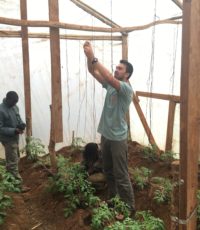
Shan stringing up tomato plants in the Guest House greenhouse.
If I were to have a conversation about “office life” with most of my friends who are working a 9-to-5 in the States or any other urban setting around the world, I think any discussion of similarities would end after the shared use of the word “office”. My “commute” is a 5-minute walk down a dirt road lined with small crop fields, dodging chickens and the occasional goat. I don’t push open the double-wide glass doors to enter the lobby before stepping into the elevator; my single-story building doesn’t have front doors, and I’m not entirely sure if there’s an elevator within 50km. The walls are built of bricks, which were made about 500m from where the building stands out of a mixture of cement and dirt
The roof is corrugated metal sheeting, and every rainy season leads to conversations held in near-shouts in a volume contest with the raindrops pounding on the metal. None of the offices have light bulbs. There’s a mouse living somewhere behind the bookshelf, yet our paths have only crossed once when he seemingly slipped, fell, and then scurried out of the open door and away down the hall. And more than once I’ve had to chase a lizard around my office, carrying a small container to catch it and return it back outside.
No, I don’t think any office I ever work in after this year will be quite like this one. And that’s sad. Because while there may not be a break room with coffee machines and couches, the 5,000ft2 main office building of Nyumbani Village is full of as much life as any other place I’ve experienced.
What makes Nyumbani so unique is the fact that it’s large enough to be called a village, yet every person who lives and works here is part of the same mission. This sharing of place and sharing of responsibility is what leads to an environment of cohesion and mutual trust, and also strengthens the friendship between coworkers. While the pace of work may be slower than the typical office in the States, the tradeoff is the time spent connecting with one another, conversing and joking and laughing. Greetings are exchanged whenever you pass someone in the corridor, and the twice-daily tea time is always looked forward to as a time to further enjoy shared time with coworkers.
Wherever I end up after this year, I hope to carry with me some of these workplace values that I have come to appreciate during this year. By taking the time and effort to strengthen the ties of community in the office on a daily basis, common goals are achieved with greater enjoyment and fulfillment.
Notes from the Field
By David Bartels, 2006-07 Fellow with Baylor International Pediatric AIDS Initiative in Lesotho, and Devan Darby Bartels, 2006-07 Fellow with Harvard University AIDS Institute in Botswana
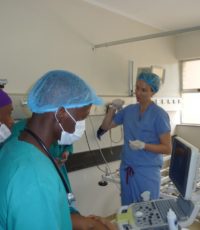
Devan Darby Bartels, MD MPH teaching basic ultrasound use to staff and students at Princess Marina Hospital.
We were fresh graduates of Princeton in 2006 when we arrived in southern Africa for “service for a year.” Devan was bound for Gaborone, Botswana, and the Botswana-Harvard Partnership, and David was bound for Maseru, Lesotho, and the Baylor International Pediatric HIV/AIDS Initiative. Our fellowship year unfolded with new experiences and friendships, lessons learned, and challenges met. Our time in southern Africa convinced us to pursue medical training, and, upon our return to the US, we promised ourselves that we would return. Devan earned an MPH, and David worked on the Global Burden of Disease Study. We graduated from Harvard Medical School in 2013 and are now close to finishing anesthesiology and critical care residency at the Massachusetts General Hospital (MGH).
As PiAf fellows, we encountered multiple physician role models, who were making a positive impact through medical education, research, and capacity building, and we dreamed of returning to southern Africa as physicians to do the same. From afar, we watched the progress that was being made. Now, a decade later, we have had the privilege and opportunity to return to Botswana. Under the supervision of our MGH mentors, at the invitation of the University of Botswana School of Medicine (UBSOM), and with the support of MGH Global Health and the Partners Centers of Expertise, we arrived in Botswana in March with a threefold mission: (1) assist medical student education efforts (2) offer stakeholder-driven workshops to UBSOM and Princess Marina Hospital (PMH) staff, and (3) assess capacity at UBSOM and PMH for an MMed program (residency) in anesthesiology and critical care. Over the past month, our days have been divided between the ORs, tutorial rooms, and meetings with various stakeholders. We have implemented hands-on workshops, covering airway management, basic monitoring, ventilator management, vascular access, neuraxial anesthesia, and ultrasound use. We have been able to learn about the current state of anesthesia and critical care in Botswana, explore the ecosystem of existing medical programs, and assess the potential for collaboration.
Reflecting on our path, it is clear to us how formative our PiAf fellowship year was to our worldview and careers. We are grateful for our experiences in Botswana and Lesotho, and have carried them with us. Looking forward, we see an opportunity to contribute to Botswana by helping build anesthesia and critical care capacity. Anesthesia and critical care form the backbone of a robust surgical care system, and Botswana desperately needs this capacity. As people live longer, surgical disease becomes an increasing contributor to morbidity and mortality. As we prepare to complete our residency, we know that it will not be another decade before we return. We have been able to form relationships over this past month that make us optimistic that long-term collaboration is possible. We see how far Botswana has come in the past decade, and we see the potential for the future. We hope to help our colleagues in Botswana build that future. For us, that is “commitment for a lifetime.”




